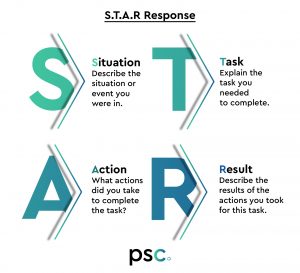The “new normal” is no longer new and it is now just normal. Organisations have pivoted to remote workforces and in a survey conducted by video conferencing platform, Whereby, 82% of companies believe they will keep their work from home approach indefinitely. Some companies like Fintech giants, Square, have already put this in place and said as early as May 2020 that they will not be returning to the office.
With the world going remote, what does this mean for the humble job interview? The likelihood is that you will not be having a face-to-face for a while. Instead, you will now have a request for a video interview hitting your inbox if you make the shortlist for a role. The question now is how do you prepare, what questions should you expect and how do you know if the new(ish) format is going well? As a specialist IT recruitment agency we are well-versed in the world of interviewing and our blog post today will help you take your skills to the next level, getting you ready for anything.
Contents
- Types of video job interview.
- 8 killer tips for nailing your video job interview.
- 8 common video job interview questions.
- How do I know my interview is going well?
Types of video job interview
There are two main types of video interviews that you will come across when you have successfully applied for a job; pre-recorded interviews and live interviews but what is the difference?
Live video interviews – It is much like a traditional interview where you will speak to one or multiple people in real-time. They will ask you questions and expect you to answer in a back and forth conversational format. These interviews are traditionally conducted through video conferencing software like Skype, Zoom or Google hangouts.
Pre-recorded interviews – More employers are using pre-recorded interviews for the first stages of their recruitment process. Rather than speaking to someone directly, you will be given a question and expected to provide a recorded response within a certain time limit. It can seem daunting but the software they use will usually give you a do-over if you mess up. The format can feel impersonal, but a successful pre-recorded interview will result in a live face-to-face interview.

Image by Tirachardz at freepik.com
Tips for nailing your video interview.
- Test your technology.
First impressions are key, and you will not give a great one if you are fiddling with wires or making excuses about why your camera is stuck on a certain filter. Before your interview test the relevant programmes and hardware so you can be confident on how to use everything. The last thing you want to do is deliver a killer answer and realise your microphone is turned off.
- Practise with a friend before the interview.
This is a great way to test your sound quality and set up your camera so you are well proportioned on screen. Ideally, you want to ensure there is a bit of empty space above your head and check that your shoulders and upper chest are visible. Get your friend to give you feedback on the speed you are talking and to highlight any habits you do not realise you are doing, like fiddling with a pen or staring into space.
- Dress appropriately.
You always want to dress to impress for a job interview so make sure you are as formal as you would be if you were going to your potential employers’ office to meet them. Being at home there is the temptation to be more comfortable, but we advise taking the time to get dressed properly (top and bottom) so you send the right message.
- Let the people you are living with know you are interviewing.
Professor Robert Kelly’s interview with the BBC is a prime example of why you should let those you live with know your schedule to prevent any interruptions. Interviewers are real people and, in most cases, will see the funny side of things but the distraction could throw you off your flow and affect your ability to concisely deliver relevant answers to questions.
- Be early.
By a few minutes; if this were the real world then you would not show up to the interview exactly when it starts. Most interview links will let you sit in a virtual waiting room so try to get in there around five minutes before you start. It will also give you the chance to check your equipment. Make sure you are postured correctly and your set up is how you want it to be.
- Be present.
You should always try to prepare as much as possible for an interview. If you have notes on your desk that you have prepared, only glance at them briefly and no matter how sly you believe you can be, do not try to use search engines. It will be obvious that you are distracted, and you might miss an important question or information from the interviewer.
- Do not talk over the interviewer.
This seems obvious but many video platforms will mute another participant if you start talking. It is great you are keen to deliver your response but diving in too early can come across as rude. In many cases, video feedback can be delayed so give a short amount of time after your interviewer has finished their point before responding just to be sure they’re done.
- Treat it like a real interview.
This is the most important tip we can give you, although the settings might be different, it is still a real interview. You want to make a connection with those you are talking to by being personable while professional. You are not there to just answer questions, you need to give your potential employer the chance to get to know you, feed questions back to them and build a rapport that makes you someone they want to work with.
8 common video job interview questions.
Now we have covered the tips for nailing your video interview, let us look at the type of questions you could be asked during your interview. The truth is that video interview questions will not differ from face-to-face interview questions and will vary depending on the role you have applied for.
8 popular interview questions include:
- Tell me about yourself?
- Why are you interested in this position?
- What do you know about this company?
- What are your strengths?
- Describe your work ethic?
- Give an example of how you work well in a team?
- Tell us about a challenge you faced and overcame?
- How do you deal with pressure?
Answering these questions efficiently is down to you. There is no bog-standard answer as it needs to be relevant to your experience and the position you are applying for. Research the company and how your skills apply to the position you are interviewing for to nail any question that comes your way. When answering a competency-based question, we do advise using the S.T.A.R response method to deliver your answer effectively.

How do I know it is going well?
Regardless of coronavirus changing the interview process from face-to-face to digital, the signs that things are going well remain the same. One key factor would be if the interviewers are trying to sell the benefits of the company to you. In an interview it is about marketing yourself, if the interviewers are starting to tell you about the many perks of working there then it is a positive sign they want to move forward with your application.
Another indicator that it is going well is how the interview feels throughout. As time progresses, does it begin to feel more casual and easier to communicate, almost like talking to a friend? This is a great way to tell if you are developing a personal connection with the interviewers. We spend most of our time working, so it is key for many that they get on with their colleagues to make their professional lives a bit easier.
Finally, has the conversation shifted from discussing your experience to talking like you have already got the job? Do they use language like, “when you start” rather than “if you start”? If yes, these are very positive signs. They could also ask about references and the expected salary you need to come on-board. If you had the worst interview in the world then they would not waste their time asking these questions, truth be told they probably would have made an excuse to end the interview half an hour earlier.
Summary
The format of the interview might have changed in the “new normal”, but the goal remains the same, to sell yourself in the best possible way you can. Be confident in your ability, do your homework on the company you are applying for the role with and you will nail your upcoming interview. Good luck!



